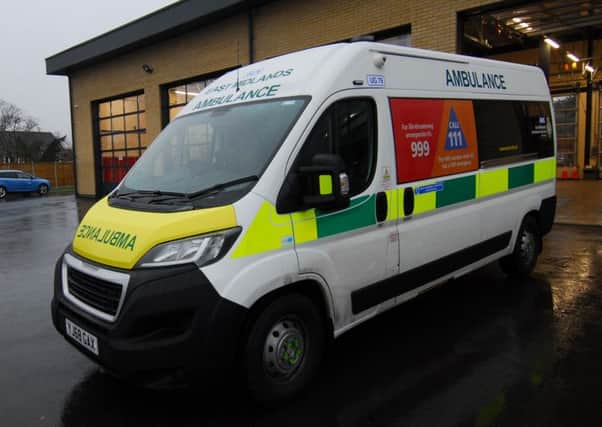East Midlands Ambulance Service outlines action to help meet winter demand


While every winter means an increase in demand, a rising population and growing numbers of older people and those with multiple, long-term conditions means the service is forecasting even more calls.
EMAS chief executive Richard Henderson said: “We know we will be busy and we know that at times we will have to prioritise patients, treating those with urgent and immediately life-threatening injuries and conditions first and asking others to wait until crews become available.
Advertisement
Hide AdAdvertisement
Hide Ad“There is no one single thing that will ease demand but we all have a part to play.
“We continue to work with all hospitals across our region to reduce delays when handing over patients at accident and emergency departments so that our vehicles are back out on the road as soon as possible.
“We are working closely with GPs and our hospital and community health trust partners to reduce the number of people we take to accident and emergency by establishing and clarifying new pathways.
“We are promoting information for patients about the best, quickest and most appropriate places to get the help, for example visiting a pharmacist or local urgent treatment centre.
Advertisement
Hide AdAdvertisement
Hide Ad“And we are supporting our staff to help keep them healthy at work and out on the road during what we expect to be a sustained period of high demand.”
Long-term transformation within EMAS and work with other NHS and care system partners to operate more effectively will also support winter-related moves to reduce 999 calls and journeys to accident and emergency departments.
EMAS is already investing in extra clinical staff (280-plus by the end of the current financial year), ambulances and other resources to help respond more quickly and more consistently to 999 calls and urgent GP requests.
Between now and the end of December, 47 Urgent Care ambulances will be introduced across the East Midlands to support newly recruited Urgent Care Assistants.
Advertisement
Hide AdAdvertisement
Hide AdFollowing the recent introduction of 68 new accident and emergency ambulances, a further 67 will come into service between December and March. Of these, 40 are replacements and 27 are additional vehicles.
This is part of an £8.7million investment in EMAS’s fleet.
As in previous years, EMAS is preparing for demand to rise during December and into January. Activity is anticipated to be high on key dates (so-called black eye Friday on December 21 and New Year’s Day, for example) and incidents in December and January are likely to peak at around 4,000 a day, with around 780 of those coming from Lincolnshire.
Overall activity is expected to be 3.2% higher than last winter.
In readiness, measures being implemented by EMAS include:
* Staff working closely with hospitals to cut handover delays and to admit more patients directly to their point of treatment, rather than through accident and emergency
Advertisement
Hide AdAdvertisement
Hide Ad* Increasing resources and piloting new shift patterns and increasing the number of support staff working over the festive period to help cope with surges in demand and allowing frontline crews to focus on patients
* Offering all EMAS staff the latest flu vaccine to protect them and cutting the risk of the illness spreading to others
* Supporting staff to keep them physically and mentally fit – resilience training, peer-to-peer support – to ensure they are available to continue providing care during sustained periods of high demand
* Strongly supporting national campaigns helping people to stay well this winter, choose the most appropriate service and for at-risk groups – older people, those with long-term heart conditions or breathing difficulties – to have the seasonal flu vaccination.
Advertisement
Hide AdAdvertisement
Hide AdMr Henderson said: “Last winter was our busiest ever and our existing contingency plans mean we are ready to react to adverse weather or if flu affects large numbers of people.
“We don’t know for sure that these things will happen, but we can safely assume the number of people overall getting ill and needing our help this winter will rise.
“I am confident we have plans in place to ensure we are working as effectively as possible as a trust and as part of the health and care system. Meanwhile our longer-term plans will put us in a stronger position as we head for 2020.”
EMAS is also working with NHS partners, social care and police to take patients directly to the most appropriate service, avoiding accident and emergency departments whenever it is safe to do so.
This includes:
Advertisement
Hide AdAdvertisement
Hide Ad* EMAS Clinical Assessment Teams being able to access greater levels of patient information (currently being piloted in Leicestershire) to improve the quality of assessments and help us deliver the most appropriate care
* Piloting mental health nurses in call centres and 999 community hubs to provide over-the-phone and face-to-face care to patients for whom busy accident and emergency departments may not be the most appropriate place for treatment
* Working with GPs, community health and social care teams to treat more falls patients, frail and older people in their homes or in the community, rather than taking them to accident and emergency departments
* Aiming to assess and treat more patients at the scene and for clinically trained staff to give support and advice over the phone when it is safe to do so, rather than take people to hospital.